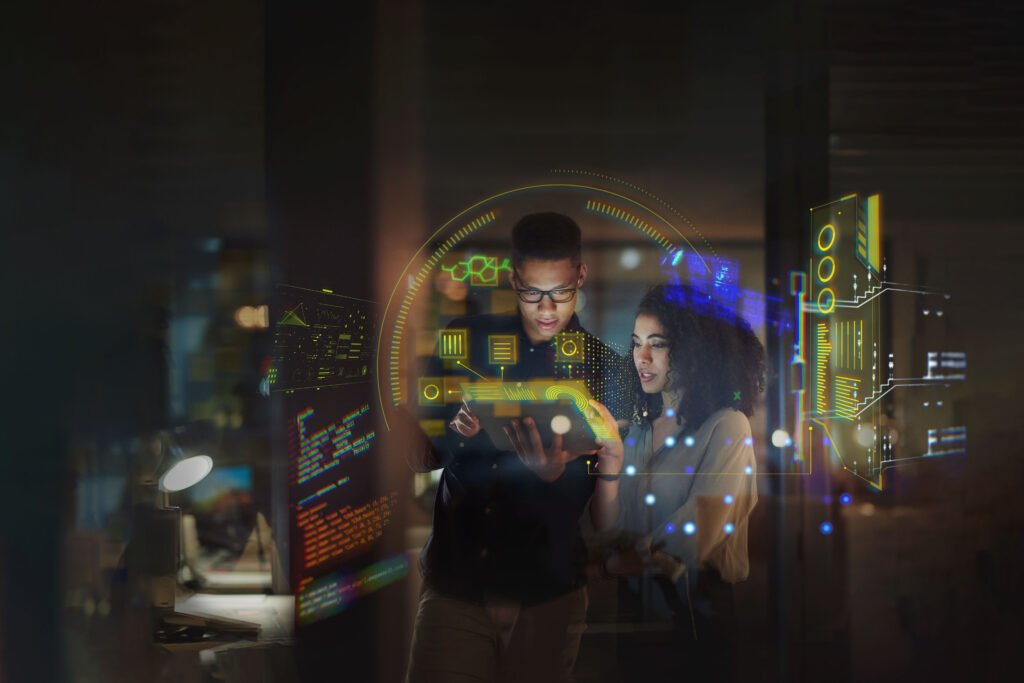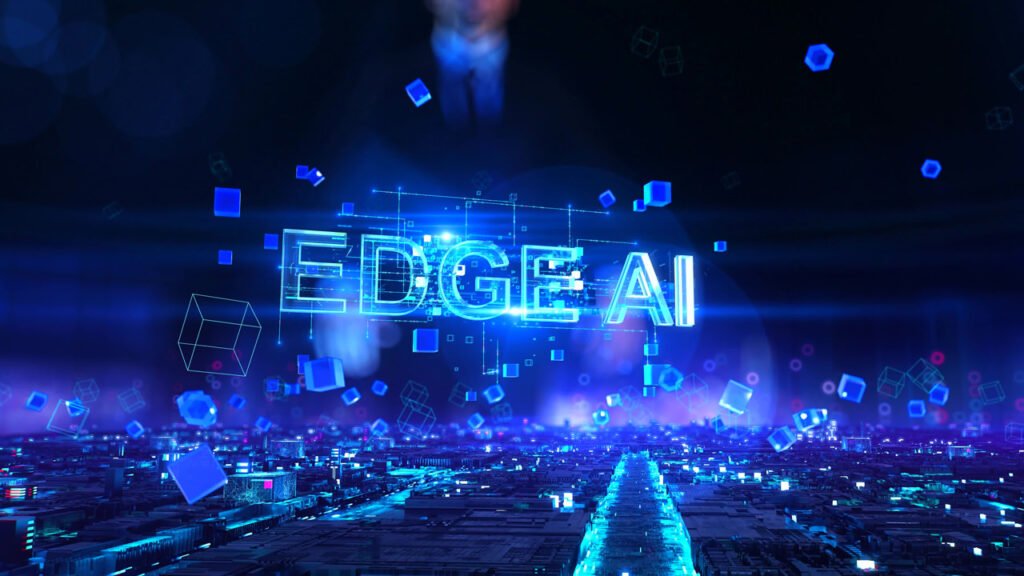
Top 10 AI Trends That Will Rule 2025: The Future Revealed
Artificial Intelligence (AI) is no longer a futuristic sci-fi idea—it’s the impetus behind today’s most groundbreaking breakthroughs. By 2025, AI will take new levels, transforming industries, rewriting human-machine co-working, and addressing global dilemmas. As a tech geek, entrepreneur, or simply a curious mind, these trends will shape the future of innovation.
Let’s explore the top 10 AI trends that will rule 2025, along with real-world applications and their impact on society:
1. Generative AI Goes Multimodal: Beyond Text and Images
What’s New?
AI tools such as ChatGPT and Midjourney are just the start. By 2025, they will become multimodal systems that can combine text, images, video, audio, and even sensory information. Just think about AI that can:
- Create a 3D animated film from a single script.
- Create a personalized video game of your choice.
- Write a personalized tune that adjusts to your mood in real-time.
Real-World Example:
OpenAI’s Sora already generates realistic video clips from text inputs. By 2025, such platforms may automate 30% of the creative processes involved in advertising and movies.
Why It Matters:
- Democratizes creativity: Small companies can create Hollywood-quality content.
- Raises ethical concerns: Who owns AI-created art? How do we fight deepfakes?
2. AI-Fueled Autonomous Agents: Your Digital Employees
What’s New?
Gone are chatbots—2025 is the year of AI agents that will behave like part-time employees. These agents will:
- Book travel, haggle over prices, and schedule appointments.
- Operate AI-powered startups with very little human intervention.
- Make medical diagnoses based on symptom analysis and lab work.
Real-World Example:
Google’s Project Astra and startups such as Cognition AI (author of Devin, the AI software engineer) are leading the charge for autonomous agents for coding, customer service, and research.
Impact on Jobs:
- 23% of routine tasks can be automated by 2025 (McKinsey).
- New professions such as “AI Agent Trainer” will appear to oversee these systems.
3. AI in Healthcare: From Diagnosis to Cures
What’s New?
AI will shift from diagnostic tools to engaged partners in healthcare:
- Personalized medicine: AI interprets DNA, lifestyle, and environmental information to tailor treatments.
- Drug discovery: Companies such as Insilico Medicine employ AI to reduce drug development time from 5 years to 18 months.
- Surgical robots: Robots such as Medtronic’s Hugo will conduct intricate surgeries with AI-assisted precision.
Stat to Note:
The AI healthcare industry will reach $187 billion by 2030 (Statista), and 2025 is a make-or-break inflection point.
4. AI Legislation: The Global Regulatory Race
What’s New?
Governments will rush to regulate AI, with an eye on:
- Deepfake bans: Legislation mandating watermarking of AI-created content.
- Bias mitigation: Requirements for fairness audits in recruitment and lending algorithms.
- Copyright wars: Who owns outputs from AI—users, developers, or the AI itself?
Key Players:
- The EU’s AI Act (2025) will determine the direction of global standards.
- The U.S. and China are writing competing frameworks to balance innovation with control.
5. AI-Augmented Workforce: Humans + Machines

What’s New?
AI won’t replace humans—it’ll supercharge them:
- Coding: GitHub Copilot is already writing 40% of code for developers.
- Design: Software like Adobe Firefly convert rough sketches into refined visuals.
- Law: AI paralegals scan contracts 10x quicker than humans.
Skills in Demand:
- Prompt engineering: Designing clear instructions for AI.
- AI ethics management: Maintaining fairness and transparency.
6. AI vs. Cybercrime: The Ultimate Arms Race
What’s New?
As hackers weaponize AI, defenses will adapt:
- Deepfake detection: Software such as Intel’s FakeCatcher identify fake videos by tracking blood flow in pixels.
- AI firewalls: Systems that anticipate and nullify threats in milliseconds.
Stat to Watch:
Gartner forecasts 30% of attacks will use AI by 2025, so AI defense products will be essential.
7. Edge AI: Intelligence at the Source

What’s New?
Edge AI handles data at the edge (on devices) rather than in the cloud:
- Self-driving vehicles: Real-time decisions, no latency.
- Factories with smart technologies: AI-based quality inspection on production lines.
- Privacy: Health data remains on your wearable device, not in the cloud.
Real-World Impact:
The edge AI market will reach $107 billion by 2029 (Fortune Business Insights), with 2025 being the year of mainstream adoption.
8. AI for Climate Action: Saving the Planet with Algorithms
What’s New?
AI will combat climate change by:
- Optimizing energy grids: Google’s DeepMind lowered data center cooling bills by 40%.
- Precision agriculture: AI drones track crop health and reduce water waste.
- Carbon capture: Startups such as CarbonCure use AI to sequester CO2 in concrete.
Stat to Share:
BCG estimates AI could reduce global emissions by 5–10% by 2030—if deployed responsibly.
9. Emotional AI: Machines That “Understand” Feelings
What’s New?
Affective computing will enable AI to:
- Detect depression from speech patterns (e.g., Kintsugi).
- Personalize education by adapting to student frustration.
- Power companion robots for the elderly (e.g., Sony’s Aibo).
Controversy Alert:
Critics warn about emotional manipulation via ads or political campaigns.
10. Open-Source AI: Democratizing the Future
What’s New?
Meta’s Llama 3, Mistral, and other open-source models will:
- Let startups compete with tech giants.
- Fuel innovation in niche fields such as regional language models.
- Raise concerns about unregulated access to powerful AI.
Key Debate:
Can open-source coexist with safety? Expect stricter licensing for advanced models.
Preparing for 2025: What Should You Do?
- Businesses: Invest in AI literacy and pilot autonomous agents.
- Developers: Master multimodal AI tools and edge computing.
- Individuals: Keep an eye on AI regulations and ethics.
Final Thoughts
The AI revolution isn’t coming—it’s here. By 2025, these trends will blur the lines between science fiction and reality. The question isn’t if AI will change the world, but how we’ll shape it responsibly.
Ready to embrace the future? Share your thoughts below, and don’t forget to subscribe for cutting-edge AI insights!